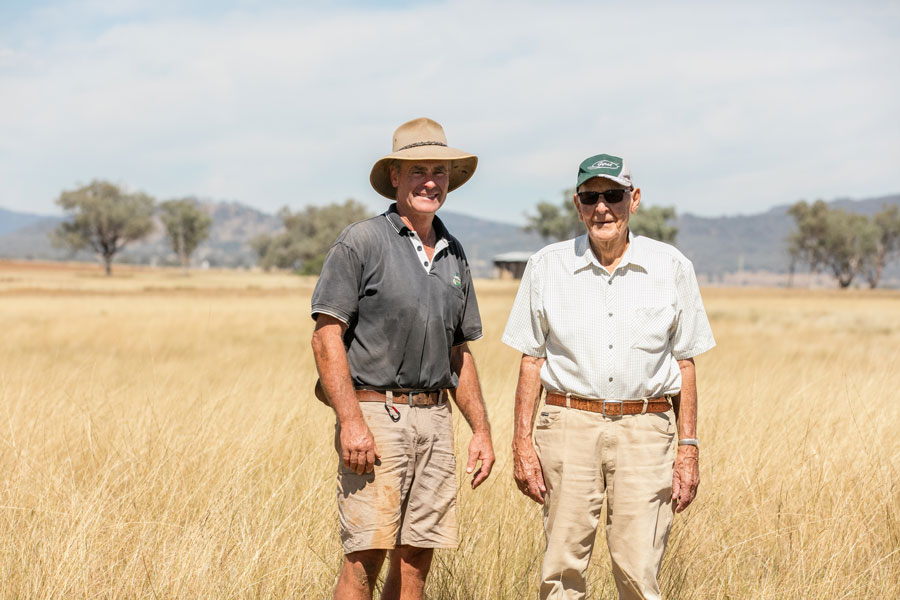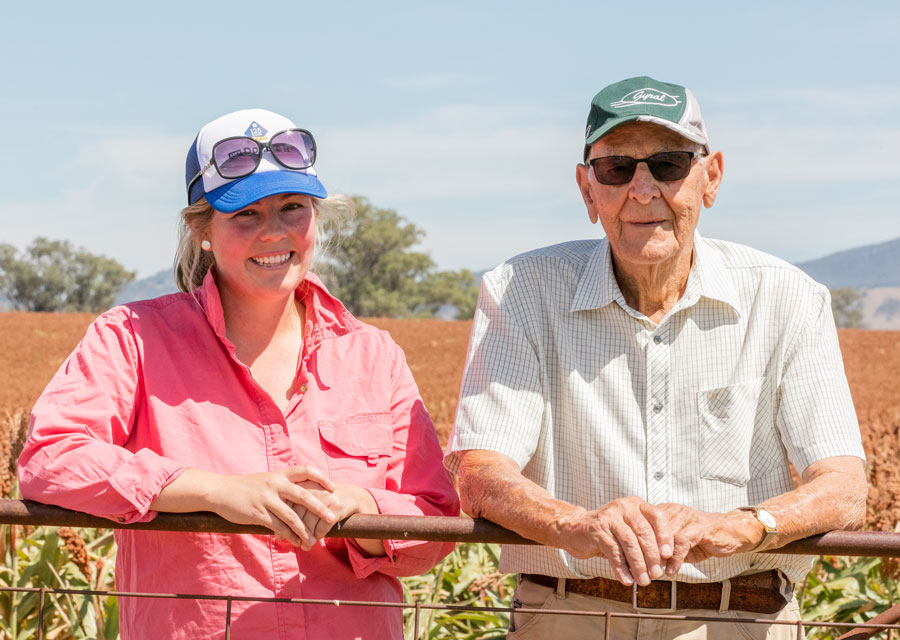Like many regions, challenges facing the northern NSW-based Duri Agricultural Bureau include rising input costs, managing crop diseases and moisture retention.
However, particular challenges for its more than 30 grower members are farm size and proximity to Tamworth.
Bureau president Emily Stirling says that without considerable scale, new technology is often out of reach from a financial perspective. “That is until it is taken on by bigger businesses and the cost of the technology reduces.”
Gavin Hombsch, who farms 715 hectares at Warral with his father Jim, a long-serving Duri member, agrees. “We have 20 neighbours on the eastern boundary on 25-acre (10ha) lots,” Gavin says. “So, there is real estate pressure as Tamworth expands. It has a ripple effect. More and more people are getting little farmlets close to town and in closely settled areas you have other considerations around your on-farm operations. You’ve got to be mindful of that and spot-on in what you do.”

Gavin (left) and his father Jim Hombsch are long standing members of the Duri Agricultural Bureau. Photo: Mel Jenson
One challenge the group is keen to investigate is resistant ryegrass and how best to manage it in a grazing environment.
Gavin says intensive grazing, with the intention of overgrazing, is a possible solution. “You have such an impact on the plant that it gives up.
“Often in our area we are relying on having to use more-difficult or dangerous chemicals to address weeds. Dedicated croppers don’t entertain grazing because they don’t want livestock treading all over their land and I get that. But we are not achieving what we want with chemistry.”
Emily says Duri is not financially equipped to independently do what is required for extensive research. “Historically, we’ve had a close association with the NSW DPI and collaborate with them, providing trial sites.”
However, using intensive grazing as a means of controlling chemical-resistant species could be trialled. “Given the mixed-enterprise farming businesses in our local area, grazing continues to be a valuable part of our operations. And we are looking to see what benefit intensive grazing may have. It could offer a more environmentally acceptable approach.”
Working with GRDC
GRDC northern grower relations manager Bob Ford says GRDC is keen to work with grower groups such as Duri and listen to its ideas.
“In many cases, they do their own trial work to inherently fix an issue that is occurring on their farms or they communicate as a group back to GRDC with an issue or idea that may lead to investment projects. They have strong ideas on what is required locally and regionally to improve farming in their community,” Mr Ford says.
He says grower groups such as Duri in northern NSW have traditionally been used for both social events and also to communicate important farming information among peers. He wants this to continue, especially for time-poor growers. “Good communication among neighbours and regional farmers means the ‘word gets around’ on new research and technology.”

Duri Agricultural Bureau president Emily Stirling and patron Jim Hobsch. Photo: Mel Jenson
After farming for more than 70 years, Jim Hombsch knows the value in these sentiments.
Jim has seen many changes come and go, from chemicals to crops and new machinery. However, one thing that remains constant is the need for human interaction, to network and learn from others.
For Jim and others in his area, that need is filled by Duri, one of the longest-running agricultural bureaus still operating in NSW.
“As farmers, we mostly work in isolation,” he says. “And it’s the human interaction in groups like ours that makes a difference. There is a social side – we have annual dinners and after every crop competition we catch up to chat.”
The group meets every three months to discuss issues and hear from guest speakers.
Emily, who farms at Bithramere with her husband Murray Stirling, says that in its simplest terms, Duri provides a forum for members to meet regularly, share information and support each other. Many members also host research trials for NSW DPI and other organisations.
“Duri has always worked closely with public and private organisations and commercial companies to access the best information and technology to improve our practices and shared that information with our members – and that remains our focus today.”
The group also has well-known research agronomist Loretta Serafin as a member. Loretta is a summer grains expert and leads the NSW DPI summer grains research program. As well as working on a PhD in sorghum agronomy for low-rainfall environments, she farms near Tamworth.
For more details on GRDC’s grazing research and grower group support:

























































